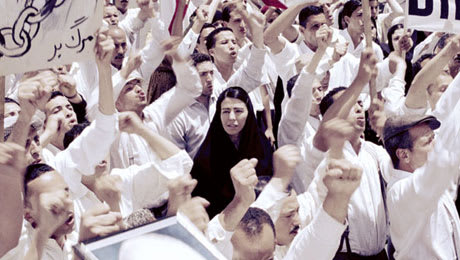Like Tom Ford, who recently made the jump from Gucci fashion designer to creating Oscar-nominated films, director Shirin Neshat, who has a background in photography and visual art, offers up a visual feast in Women Without Men, a story of four Iranian women in 1953 raging against the rule of men in pre- coup d'état Tehran. As each scene unfolds delicately, the audience becomes acutely aware that each frame of this film could also be a Pulitzer-prize-winning photograph, and of the swift ease in which we are willingly drawn into this haunting, nuanced narrative.
Beginning with a quiet suicide, we follow Fakhri, Munis, Zarin and Faezeh as they journey from the mental, emotional and physical abuse at the hands of men, finding solace and retreat in a flourishing orchard beyond male rule, while outside the walls, the CIA-backed coup d'état, which deposes the democratically elected Prime Minister and reinstates the Shah's dictatorship, rages on with fatal consequences.
A cross-platform feminist art project, at once scattergun and fine-tuned, tossing off women's lib references as passionately as they deserve, this film, based on the novel by Shahrnush Parsipur (who delightfully cameos as the brothel madam), is as adroit as it is vicious, combining experimentalism (fantasy sequences with hit-and-miss effectiveness) with a dizzying array of political references. The tantalizing (and I seldom use that word) juxtaposition of imagery and allegory employ an atypical paradigm, staying away from the traditional agit-prop fare. Certain standalone moments - like Zarin scrubbing her skin raw in a women's bathhouse or the recently deceased Munis clawing out of the dirt she was buried in to jump clean into a pool of azure waters - are both bittersweet and gripping.
For the duration of this film, it is possible to imagine - no, witness - any Iranian orchard that could truly be devoid of men. Indeed, when a ghostly chorale of male voices does penetrate their solace, we are taken aback, as though this grief has been beamed in from somewhere we no longer know. There are obvious parallels being drawn with last year's Green Revolution against Mahmoud Ahmadinejad's election, and the film is even dedicated to the memory of the countless hundreds who were detained or killed in that struggle.
Indeed, as the third act draws to a close, we are reminded that loss of female liberties, the loss of life and the loss of political sovereignty are all the same thing. This is a sumptuous, evocative film, and it's about time Iranian women get the airtime they deserve.
(Mongrel Media)Beginning with a quiet suicide, we follow Fakhri, Munis, Zarin and Faezeh as they journey from the mental, emotional and physical abuse at the hands of men, finding solace and retreat in a flourishing orchard beyond male rule, while outside the walls, the CIA-backed coup d'état, which deposes the democratically elected Prime Minister and reinstates the Shah's dictatorship, rages on with fatal consequences.
A cross-platform feminist art project, at once scattergun and fine-tuned, tossing off women's lib references as passionately as they deserve, this film, based on the novel by Shahrnush Parsipur (who delightfully cameos as the brothel madam), is as adroit as it is vicious, combining experimentalism (fantasy sequences with hit-and-miss effectiveness) with a dizzying array of political references. The tantalizing (and I seldom use that word) juxtaposition of imagery and allegory employ an atypical paradigm, staying away from the traditional agit-prop fare. Certain standalone moments - like Zarin scrubbing her skin raw in a women's bathhouse or the recently deceased Munis clawing out of the dirt she was buried in to jump clean into a pool of azure waters - are both bittersweet and gripping.
For the duration of this film, it is possible to imagine - no, witness - any Iranian orchard that could truly be devoid of men. Indeed, when a ghostly chorale of male voices does penetrate their solace, we are taken aback, as though this grief has been beamed in from somewhere we no longer know. There are obvious parallels being drawn with last year's Green Revolution against Mahmoud Ahmadinejad's election, and the film is even dedicated to the memory of the countless hundreds who were detained or killed in that struggle.
Indeed, as the third act draws to a close, we are reminded that loss of female liberties, the loss of life and the loss of political sovereignty are all the same thing. This is a sumptuous, evocative film, and it's about time Iranian women get the airtime they deserve.
